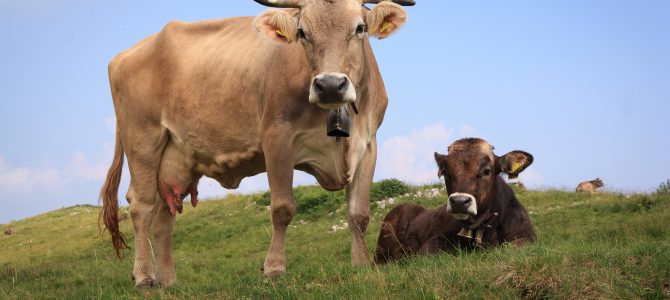
The state of Oregon is considering legislation to regulate farting. Cow farts, that is. Advocates of the bill argue that government regulation of cow farts, or “dairy emissions” as they call them, is a commonsense measure to prevent global warming and the safety of the public.
Citing the dangers of bovine flatulence, a spokesperson for Oregon Physicians for Social Responsibility stated that cow farts are dangerously unregulated and preventable. According to a letter sent to the Senate Committee on Environmental and Natural Resources, in addition to smelling bad and causing global warming, cow farts can irritate your eyes, cause memory loss, and even death. These are all good things to keep in mind the next time you find yourself eye-level with the business end of a cow. You won’t even remember what killed you.
What else can you expect from a state that makes it illegal to pump your own gas or whistle underwater (don’t knock it till you’ve tried it)? Senate Bill 197 is in response to the construction of new industrial dairy operations that would house 30,000 cows, produce 210,000 gallons of milk daily, employee up to 150 people in an economically disadvantaged area, and be the second largest dairy operation in the state. In a county where the average yearly income is just around $20,000, this dairy operation would invest $50 million into the local economy every year.
Two Years Down the Crapper
In a letter to the editor, the owner of the proposed dairy, called Lost Valley Farm, outlined the exhaustive steps they are taking comply with environmental law, including using existing water rights, protecting water quality, and developing a zero-waste, zero-discharge system that is the best in the industry. Despite efforts to be sustainably conscious, the operation’s final permit has been held up for two years by an outcry of Oregonians worried about breathing moo fluffs.
Lost Valley Farm’s groundwork to be sustainable and environmentally friendly is not unique by any means, but reflects an industry standard. While opponents to dairy farming want to reduce the numbers of cows in Oregon through government regulation, the dairy industry is inspired by a desire to minimize inefficiencies by reducing unwanted cattle poofs.
“As we get new science,” says Troy Downing, a dairy specialist at Oregon State University, “our industry is adopting it quicker than we would through regulation.” Dairy farms have voluntarily begun implementing their own emission programs by installing methane digesters to turn gasses into energy production. In typical backward fashion, big government advocates throw roadblocks in front of innovation, while industry advocates are busy turning the ghosts of poo into electricity.
As I’ve mentioned previously, Oregon has a longstanding tradition of disrupting economic growth. Dairy represents one of the top agricultural commodities in Oregon, contributing more than $1 billion to Oregon’s economy, thanks to around 228 dairy farms and 125,000 cows. Milk is even Oregon’s official state beverage, for crying out loud!
Additionally, Oregon is consistently ranked in the top five states for milk quality. You can only achieve that kind of quality through good environmental stewardship and healthy, tooting cows. In contrast, Oregon is consistently ranked as one of the poorest states in the union behind West Virginia and New Mexico. So why would Oregonians try to shoot themselves in the hoof by regulating to death one of the major contributors to their economy?
We’ve Smelled This Before
Well, we’ve done it before. In the mid ’80s, an environmentalist group petitioned the U.S. Fish and Wildlife Service to list the spotted owl as an endangered species, setting off years of controversy between the timber industry, environmentalists, and the government. Finally, in 1990, the spotted owl was declared a threatened species, which led to severe regulations of restricting logging within a 1.3 mile radius of spotted owl activity.
The move effectively gutted the Oregon timber industry, which accounted for 65 percent of Western wood, leading to a radical decline in employment and the Oregon economy, and higher consumer prices. It’s not an uncommon sight to drive through practical ghost towns on the Oregon coast that were once bustling hubs of the timber industry. For about $3 million you can even buy your own former timber town.
To environmentalists, the benefits of their perceived goals outweigh the human collateral damage, even when their efforts accelerate the outcomes they fear. New research from the Oregon Fish and Wildlife Office propose that the very actions used to protect the spotted owl have encouraged its extinction. In the end, the declining spotted owl population had little to do with logging and more to do with the fact that spotted owls just don’t like having sex with each other (unlike barred owls, which love having sex).
So a new strategy by the U.S. Fish and Wildlife Service involves federal wildlife biologists shooting barred owls in an attempt to save spotted owls. Ultimately, when big government steps in the save the day, it typically becomes a self-fulfilling prophecy made more amusing by the bungling of incompetence.
History is repeating itself with the dairy industry. Although dairy has been a major industry since before it was even a state, Oregon is largely considered to have some of the best air quality of any state. Likewise, Oregon’s air quality consistently maintains the highest rating by the Environmental Protection Agency as well as passing the American Lung Association’s air quality analysis. With this kind of track record, OSU’s Troy Downing has every right to be confused. “Oregon really has no air quality problem,” Downing said, “What problem are you trying to fix?”
If successful, Oregon would join California in taking the fight against global warming to ol’ Bess. Regardless of revolutionary innovations, meeting rigorous regulatory standards, and providing a necessary benefit to the economy, environmental advocacy groups are still raising a stink. Ultimately, restrictions like the one proposed in Oregon are successful in reducing dairy emissions, just not in the way you’d think.
California has seen a dramatic reduction in dairy production with an exodus of dairies like Lost Valley Farm to other states. These types of laws have proven not to help the environment, but only attack businesses. Once passed, this law could prove silent but deadly for Oregon’s economy.









